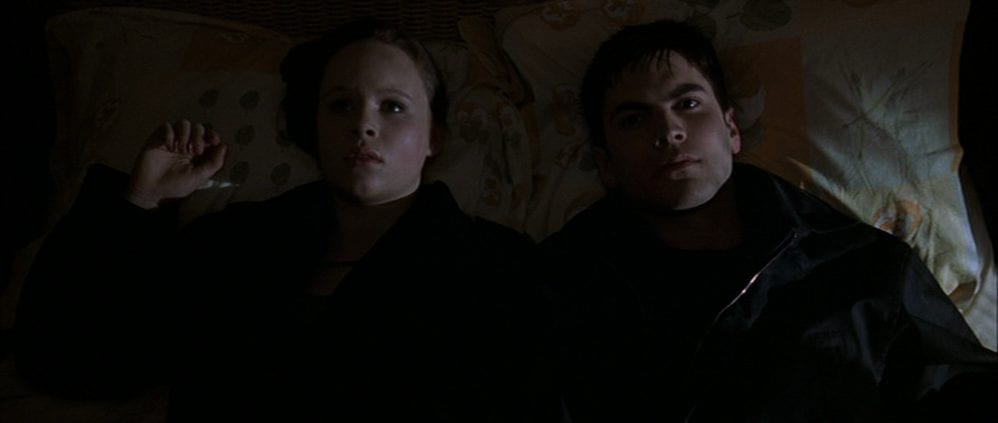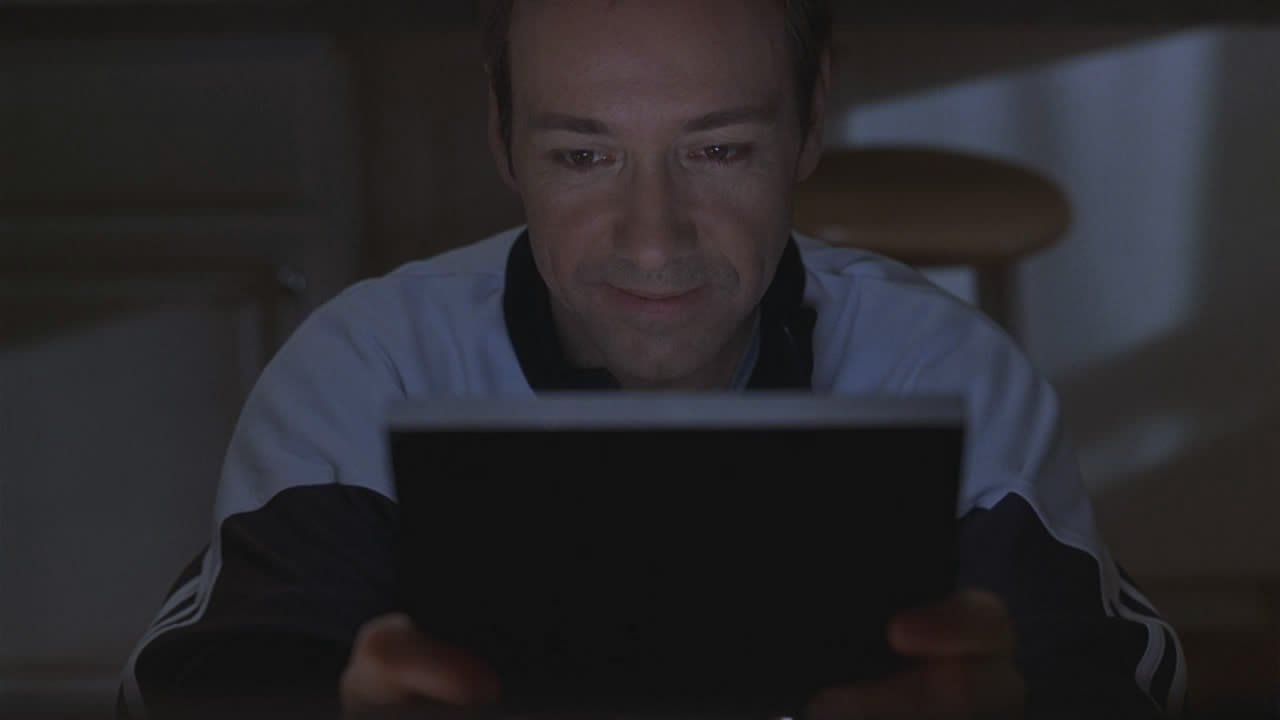If I say, “Surely the darkness will hide me and the light become night around me,” Even the darkness will not be dark to you; the night will shine like the day, for darkness is as light to you. -Psalm 139:12
He is before all things, and in Him, all things hold together. -Colossians 1:17
“That’s the day I realized that there was this entire life behind things and this incredibly benevolent force that wanted me to know there was no reason to be afraid. Ever… Video’s a poor excuse, I know. But it helps me remember… and I need to remember… Sometimes there’s so much beauty in the world I feel like I can’t take it, like my heart’s going to cave in.” -Ricky Fitts
noun
-
a period of spiritual desolation suffered by a mystic in which all sense of consolation is removed.
-
“Pain, you made me a believer” -“Believer” by Imagine Dragons
-
“I don’t think there’s anything worse than being ordinary.” -Angela Hayes
Note: This piece will focus on American Beauty from a spiritual and faith-driven perspective. One of the film’s major themes is how God’s beauty appears in unexpected, ordinary, and sometimes even dark places. I will begin the essay by relating a personal story about a time in my life when I faced a major crisis of faith. I will use this story as a springboard discussion into an analysis of the film.
I almost lost my faith about four years ago. I made a series of scathingly poor decisions that landed me in serious debt and near-suicidal depression. I was utterly convinced that I would never find love, never secure a respectable job, and never move out of my parents’ house. I believed that I had irreparably ruined my life.
During this time, I cried out to God but heard nothing. Throughout most of my life, I’ve felt connected to His presence, but within these few years, that feeling of wholesomeness was replaced with a painful gnawing emptiness that I could physically feel every moment of every day. I attempted prayer, but it was if I had no interest. I couldn’t find the words; I doubted whether there was any kind of loving presence that cared for me or anyone else on Earth. I was completely broken.
Miraculously, as time went by I regained my footing. My faith was restored as my confidence grew back. I found both an apartment and a job that would pay the bills, as well as a few groups of friends. Nowadays, I’m dating regularly and am enjoying writing for this site. Looking back, I realize that dark period of my life had immense value, for I now appreciate all that I had lost and have now regained, especially my faith. You could almost say the torment I underwent had a sort of beauty to it, a value I could not recognize while in its midst, berating and punishing myself for being a failure. As of now, I strongly believe that during my anguish there was one who saw me as beautiful and successful, even whilst I was absorbed in continual self-hatred.
American Beauty makes no efforts to hide the fact that is a heavily spiritual work. Lester begins his narration by informing viewers that in less than a year, he’ll be dead. He is speaking with knowledge of his death so one can assume that his narration comes after the fact. The implication is that Lester is currently in the afterlife, presumably Heaven. The way the camera zooms slowly down from the sky towards Lester’s neighborhood implies his view from a vantage point separate from physical reality. The closing narration of the film further implies this, as Lester speaks to his audience about the beauty of his life and the world: “You have no idea what I’m talking about, I’m sure. But don’t worry…You will someday.” Lester has reached enlightenment and has adopted a viewpoint that recognizes the beauty in the world, in spite of, and perhaps because of the pain and brokenness that is also present there. This viewpoint encapsulates American Beauty’s main major theme, and as I will argue, the film’s depiction of God’s perspective as well.

If American Beauty centers its theme on the beauty of God’s creations, then Ricky Fitts is its main spokesperson. Heavily romantic and spiritual, Ricky believes that a benevolent force lies behind the physical world and finds his peace in connecting with what he deems beautiful. As he tells Jane when she asks him about the dead homeless woman, “When you see something like that, it’s like God is looking right at you, just for a second. And if you’re careful, you can look right back.”
He appears to be the central moral figure in the film, but this interpretation seems flawed when further pursued. Although Ricky is kind and respectful of Jane once they enter into a relationship, he begins his pursuit of her through disrespectful means, filming her without her permission and burning her name on her front lawn. Despite his insistence that he is not obsessed and “just curious,” Ricky’s actions prove otherwise. Furthermore, Ricky quits his job and rudely tells his boss off in the middle of an assignment, sells weed as a small-time crook, and teases Jane about killing her dad. There is no doubt that there are some dark qualities to his personality.
Ricky’s abusive treatment at the hands of his father has had a profound negative effect on him, leaving him disturbed and isolated. Viewers learn that Ricky almost severely injured (and most likely would have killed) a fellow student at school if he had not been interrupted. His father then abandoned him in a psychiatric ward for two years, emotionally damaging his son. Miraculously, Ricky still loves his father. He defends him in a conversation with Jane and tells his mom to take care of him before he leaves home. Still, he searches for love elsewhere. Attaching to Jane so quickly is a way for Ricky to feel close to someone; likewise, Jane’s resentment of her mom and dad lead her to seek comfort in Ricky’s arms.

But Jane isn’t Ricky’s primary source of solace. Rather, it is how he connects to God through the beauty of the world, whether it is light or dark. When he shows Jane the video of the dancing bag in the wind, he calls it “the most beautiful thing he’s ever filmed.” To him, it serves as a constant reminder of God’s benevolent presence and His love for him. Believing in God’s love helps keep Ricky’s darkness at bay. One can surmise that the pain that Ricky experienced at the abusive hands of his father and the issues that his mother deals with on a daily basis sent him through his own “dark night of the soul.” Having known the value of pain, he sees God’s beauty in a dead bird or a smiling dead man, just as he sees it in Jane, the girl he loves. This perspective might seem twisted, but there is truth to it. God has created all things, so His beauty pervades even the darkest corners of existence. Out of all the characters then, Ricky, flawed that he is, recognizes this truth alone (at least until Lester’s revelation).
What’s interesting about the film though, is that it leaves judgment to the viewers. It never outright condemns or approves of the actions taken by Ricky. Rather, it presents his character arc in a way that leaves analysis up to the audience. This perspective extends to all the characters. They may judge each other constantly, but the film spends so much time with Jane, Carolyn, Lester, Colonel Fitts, and Angela that viewers are encouraged to look at events through their eyes. Like Ricky, all these characters are flawed, but that doesn’t make them unsympathetic. As the film lingers with them in their brokenness, it encourages compassion for them, even in their darkest most vulnerable moments. When Carolyn realizes her affair is a lie and screams her heart out, the pain is felt. Even though the movie ends with Ricky’s father murdering Lester, it’s difficult not to feel for the Colonel as he breaks down in front of his future victim. These are human characters, and the fronts of perfection they project upon the world gradually fall revealing their weaknesses and vulnerabilities. This idea is personified in Angela.
Angela serves as a symbol of perfection for most of the film. Jane is jealous of her beauty, and Lester lusts after her body. Her appearance propels Lester towards change; he attempts to live an extraordinary meaningful life versus an ordinary existence. Ironically, Angela’s greatest fear is that she is ordinary. She clings to her beauty in an attempt to tell her she’s worth something, lying about her sexual exploits and adventures, but, truthfully she’s even more insecure than Jane is. In fact, she uses Jane as a prop, in an attempt to make her feel superior. Ricky blatantly exposes her lies at the end of the film after she responds that “at least she’s not ugly” indirectly attacking Jane’s appearance: “Yes, you are. And you’re boring. And you’re totally ordinary. And you know it.” Feeling exposed, Angela runs towards Lester, seeking attention and love.
At first, Lester regards Angela as an object of perfection, “the most beautiful thing [he’s] ever seen,” but after she admits to him that she’s a virgin, the illusion fades and he’s privy to the truth. Underneath the facade of perfection that she displays, she’s a young, vulnerable, nervous, ordinary child. Lester’s redemption comes by recognizing the humanity of Angela, and it permits him to retain his own. At Angela’s question, “What’s wrong, I thought you said I was beautiful?” he replies, “You are beautiful…you are so beautiful, and I would be a very lucky man…” Lester now sees Angela as a beautiful human being, not just physically, but holistically, with all her contradictions and broken pieces.

As Lester dies, his life passes before his eyes. It lasts not for a second, “but stretches out forever, like an ocean of time.” What he focuses on is surprising. His mind does not linger on the big, exciting, grandeur facets of life, but rather on small, seemingly ordinary details that could easily go by unnoticed. He remembers falling stars, the leaves on his street’s trees, his grandmother’s hands, and his cousin’s new car. These are Lester’s “holy moments,” these are his “dancing bags in the wind,” they’re the moments where God’s foot passes by his reality. But what he most closely holds dear are his moments with Jane and surprisingly Carolyn. Although his relationships with both of them have deteriorated, he now unselfishly sees just how beautiful his family truly is and what a blessing they have been in his life. He acknowledges that he could be pissed off about his death, but that “it’s hard to stay mad when there’s so much beauty in the world… Sometimes [he] feels like [he’s] seeing it all at once, and it’s too much, and [his] heart fills up like a balloon that’s about to burst… but then [he] remembers to relax” and then “[he] feels gratitude for every single moment of his stupid little life.” Lester has seen the beauty of life; his words echo Ricky’s. And now that he’s living in the presence of God, we can assume, His as well.

American Beauty argues that perhaps in our ordinariness, we are not ordinary. In all our flaws, contradictions, and messiness, we are beautiful. We are a reflection of the Divine. We don’t need to project an image of success to be successful, as Buddy insists. We already are, just by striving to be human. The film’s compassion towards its characters can easily be seen as reflective of how Ricky’s “benevolent force” truly views its creations. God does not condemn but cradles with love. And this love is readily shown to those who suffer in darkness and those who are willing to, as the film’s tagline encourages, “look closer.”


